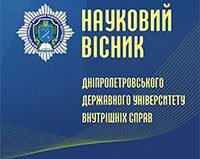Olena MOZHAROVSKA
MOZHAROVSKA O. (2023), TEACHING ANNOTATING FOREIGN TEXTS AS ONE OF THE TYPES OF SPECIALIZED SPEAKING ACTIVITY; Scientific Bulletin of Dnipropetrovsk State University of Internal Affairs, № 1, 363-368
DOI: 10.31733/2078-3566-2023-1-363-368
ABSTRACT. The article raises the issue of the importance to form the skills of annotating foreign language texts in order to obtain the information necessary for future specialists in their professional activities. The need for the ability to work with dictionary and reference literature is emphasized. The motives that force future specialists of technical and legal fields training to find the necessary information and use it with the help of annotating different kinds of scientific, technical and legal literature are described. The author points to the necessity of forming the summarization skills for obtaining the information from foreign scientific and technical sources. The motives that make future specialists in the technical field learn to find the necessary information and obtain it by annotating scientific and technical literature are presented. The reasons that encourage future industry technicians to be able to quickly find and annotate some necessary information from scientific literature are listed.
It is meant that the annotation is a short description of the work, the printed article and the manuscript. It is a brief descriptive characteristic of the primary source. The subject of this publication is revealed without further disclosure to the reader. An abstract gives an indication of the nutrition that the primary source of information should have.
Mastering the skills of annotation leads to a significant increase in the level of foreign language knowledge: it allows to quickly navigating the special literature; not to spend a lot of time on translation, clarifying the semantic structures of technical concepts with the translated text, its content. The author also emphasizes that annotation reflects the process of information analytical and synthetic processing of the primary text.
Keywords: annotation, foreign language sources, reading as a type of foreign language speech activity, competences, skills formation, annotation types.
- References:
- Boretska, H. E. (2012) Metodyka formuvannia inshomovnoi kompetentnosti u chytanni [Methods of formation of foreign language competence in reading]. Inozemni movy. № 3(71). рр. 18–27. [in Ukr.].
- Voronina, K. V. (2013) Osnovy perekladatskoho anotuvannia ta referuvannia tekstiv riznykh typiv i zhanriv [Basics of translation annotation and abstracting of texts of various types and genres] : navch. posibnyk. Kharkiv : KhNU imeni V.N. Karazina. 120 р. [in Ukr.].
- Drapaliuk, H. S., Pyndyk, N. I. (2018) Rozvytok ta formuvannia movlennievoi kompetentsii v pysmi [Development and formation of speech competence in writing]. Karazinski chytannia: Liudyna. Mova. Komunikatsiia : tezy dopovidei XVII naukovoi konf. z mizhnarodnoiu uchastiu (m. Kharkiv, 2 liutoho 2018 r.). рр. 46–48. [in Ukr.].
- Shaposhnikova, L. M. (2013) Osoblyvosti formuvannia inshomovnoi kompetentnosti u chytanni yak odnoho z metodiv samostiinoi roboty studentiv [Peculiarities of the formation of foreign language competence in reading as one of the methods of students’ independent work]. Pedahohichnyi dyskurs. № 14. рр. 457–461. [in Ukr.].
- A Common European Framework of Reference for Languages Learning, Teaching, Assessment. Strasbourg, 2001. 264 p.
